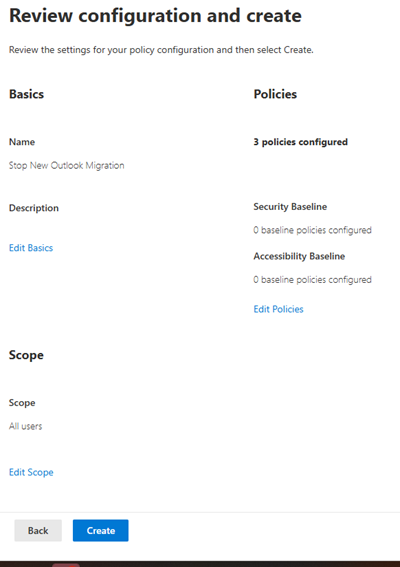Since January 2025, Microsoft has been steadily migrating users from the classic Outlook interface to the “New Outlook.” While the redesign may offer future benefits, many small to midsize businesses are finding it lacks essential functionality required for day-to-day operations. We’ve already helped several clients who were migrated unexpectedly — and weren’t ready for the change. If your organization needs to block New Microsoft Outlook to maintain control over user experience and productivity, here are three methods that work.
Method 1: Cloud Application Policy
If you are on Office 365 and have the Office 365 apps for business, you can create a policy in your Azure tenant that will configure outlook to not allow the migration to New Outlook.
Simply head to https://config.office.com and create the following policy under customization:

Then, apply the policy to all users:

Now search for New Outlook and open the the circled policies:

Apply the following settings to each field:



Almost there… Click “Review & Public,” then Create.

Method 2: Group Policy
Before setting up a group policy in your domain for controlling the New Outlook migration, make sure you have the latest office templates installed on your domain controller period. Those can be found here.
Navigate to User configuration -> Policies -> Administrative templates -> Microsoft Outlook 2016 -> Outlook options -> Other.
Configure “Manage user settings for New Outlook automatic migration” as below.

Next, find the “Admin Controlled migration to New Outlook” setting and configure as below.

Method 3: Registry Keys
In addition to GPO and App Ppolcies, we wanted to be thorough. Another way to block New Outlook is through our RMM tools where, in two simple steps, we can disable the migration via registry.
1. Disable the toggle
Open the Registry Editor (Win + R, type “regedit”, press Enter).
Navigate to: HKEY_CURRENT_USER\Software\Microsoft\Office\16.0\Outlook\Preferences.
Create a new: DWORD (32-bit) Value named UseNewOutlook and set its value to 0.
Navigate to: HKEY_CURRENT_USER\Software\Microsoft\Office\16.0\Outlook\Options\General.
Create a new: DWORD (32-bit) Value named HideNewOutlookToggle and set its value to 1.
2. Block the automatic migration
Navigate to: HKEY_CURRENT_USER\Software\Policies\Microsoft\Office\16.0\Outlook\preferences.
Create a new: DWORD (32-bit) Value named NewOutlookMigrationUserSetting and set its value to 00000000.
Need help locking it down? If you’d like help implementing these controls or testing them across your environment, schedule a quick chat with our team.

